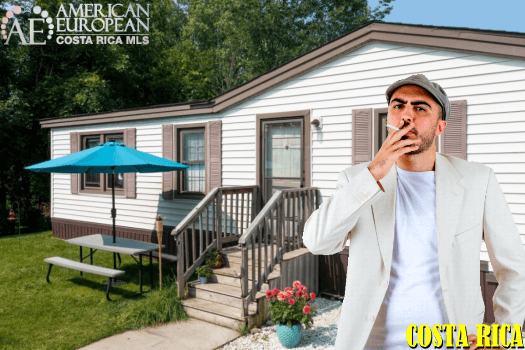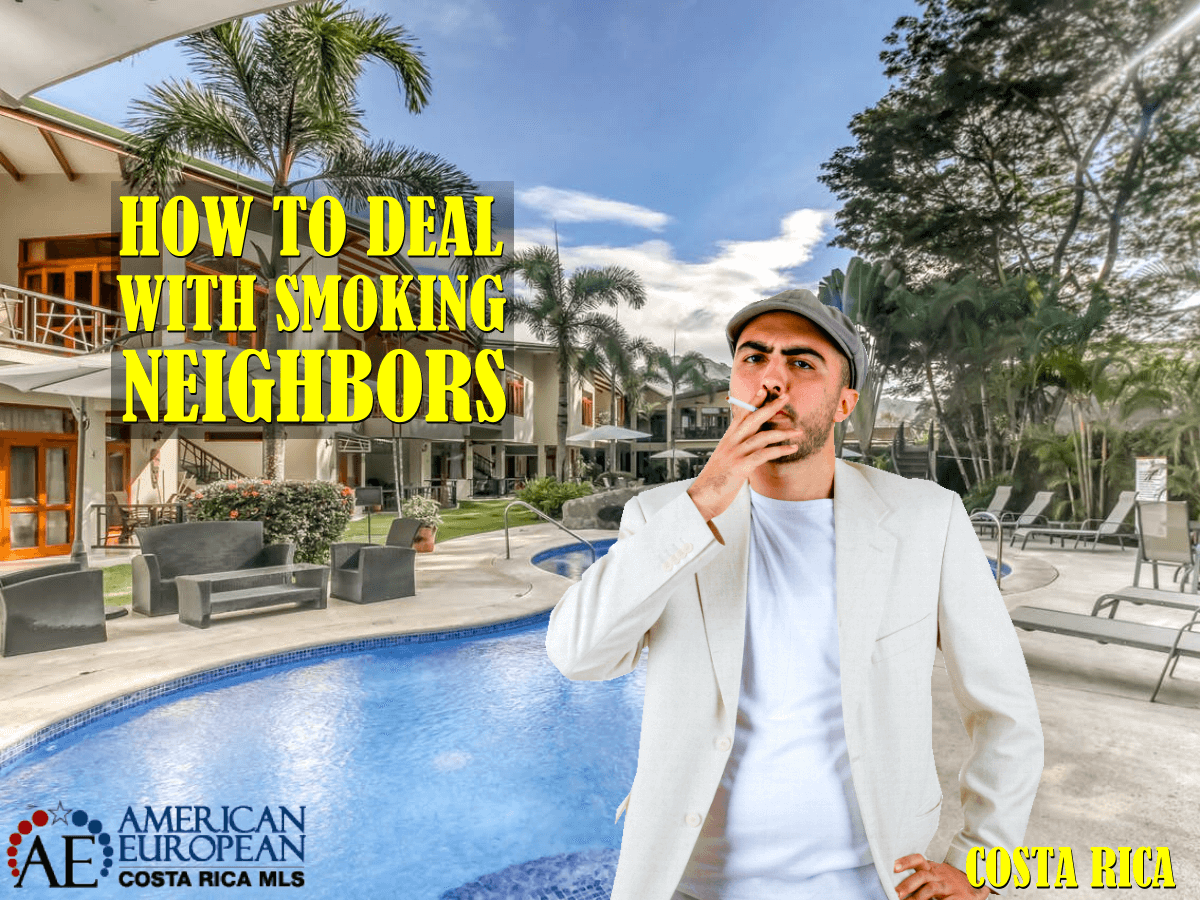Estimated Reading Time: 5 Minutes
Does having smoking neighbors bother you with increasing awareness about respiratory illnesses and other health problems? Whether it’s cigarette smoke, general tobacco, or marijuana smoke, the smell from a next-door neighbor can be distasteful.
Since 2012, we have had an anti-smoking law in Costa Rica. This law prohibits smoking in workplaces and public places, including restaurants and bars. Therefore, smokers who go to a restaurant in a mall or shopping center, for example, need to walk outside to the public road to be able to smoke.
So, even in parks and other public outdoor areas, you can expect fresh air and a smoke-free environment. However, what can one do to avoid or deal with cigarette smoke if their neighbors are smokers?
Do Apartments Fall Under the Smoking Laws?
In Costa Rica, apartment buildings have no nonsmoking regulations except for the common areas. Therefore, the common areas in your apartment complex, such as the elevator, hallways and corridors, pool, gazebo, and gym, are absolutely free of smoke. It’s the law, and any property owner and homeowners’ association will enforce it.
Unfortunately, those living in multi-unit buildings are also vulnerable to secondhand smoke from their neighbors. You probably share a wall with other owners or tenants so that the smoke might also get inside your home. For non-smokers, secondhand smoke could ruin even the quiet enjoyment and peace they should get within their own space.

How to Deal with Neighbors that Smoke
When you live in a condominium, you are expected to put up with a few quirks from the people in your building or complex. With that said, secondhand smoke from next door or even other neighbors should not be acceptable. Not only can it stain your walls and furniture, but it is downright dangerous for children, pregnant women, and people with respiratory illnesses.
You don’t have to sit around and wait for your neighbors to quit smoking, nor do you have to think about moving. The following tips might be able to rid you of that secondhand smoke for good!
1. Read Up on the Policy of Your Community
The bylaws of a condominium can be restrictive sometimes. But they’re meant to keep everyone happy and make coexistence easier for all neighbors.
If the developer built the condominium before 2012, there is probably no restriction on smoking. Ask your agent to supply the bylaws before you purchase or rent so you can check on them before you sign on the dotted line.
Some rental agreements might have a no-smoking clause, so reread them carefully. This practice may give you helpful information for avoiding secondhand smoke from your neighbors.
Even if your neighbor is a surgeon general, they don’t have the right to expose anyone to secondhand smoke. But unfortunately, many apartment complexes and gated communities are legally allowed to make their policies when constituted, even though we are still a long way from this kind of prohibition.
We don’t have any mobile home communities here yet, but the construction cost for starter and low-income homes is already an issue. A real estate developer in Costa Rica has the advantage that mobile homes don’t need a construction permit. In my opinion, a developer who promotes building and living in a manufactured home will be very successful here. And if the individual lots are large enough, having smoking neighbors won’t be an issue. And yes, this is a message for any real estate developer.

2. Open Communication with Your Neighbors Who Smoke
If you have a problem with the smoke from your neighbors, the first step is to speak up in a polite and non-accusing manner. If you don’t know them, knock on their door and introduce yourself. You can then take the following steps:
- Inform the neighbor that the smoke is harmful to yourself, your children, and anyone who is ill
- Please give them a few points on how harmful passive smoking is (remember not to adopt a condescending tone)
- Avoid any direct accusations; remember to stay kind, considerate, and empathetic
- Suggest a possible win-win solution, such as using the balcony, a well-ventilated room, or outdoor areas
Some people may not be comfortable talking to a stranger right away. If that’s the case, compose a polite letter and send it to them. You can also add some snacks to show goodwill.
Also, stay mentally prepared for adverse reactions. Some smokers feel strongly about their habits and their right to do what they please. They might also ignore any smoking clauses in the community. If they don’t compromise, you can either speak to the management or make a few changes.
3. Make Your Living Adjustments
Secondhand smoke can filter through cracks around a closed door, light fixtures, and just about any tiny opening. You can’t escape it if your neighbor doesn’t compromise on smoking in their enclosed space.
Adjustments at Home to Avoid smoke from neighbors
Try the following practices to prevent smoke from others coming into your area:
- Seal all the entry points you can find; ventilation ducts, windows, electrical outlets, windows, lighting fixtures
- Get ceiling or box fans to keep the air moving so your home doesn’t get too stuffy
- Invest in an air purifier, but keep in mind that it won’t remove all the smoke
- Convince your neighbor to use an air purifier; it will be of more use in their space (offer to split the cost or purchase it yourself)
- Use scented candles or incense to make your area smell better
- Read up on the Mayo Clinic’s tips on avoiding secondhand smoke
- Keep your apartment clean
- Wipe down flat surfaces, such as counters and tables, at least twice a week
- Vacuum-clean regularly
- Frequently deep-clean rugs, carpets, and furniture
- Occasionally wash your walls using mild detergents
4. Report to the HOA Authorities
If you see neighbors smoking in the common areas, which is prohibited by law, you should report this to the HOA authorities. Smoking might be their choice, but their freedom ends when another’s health is at stake.
The bylaws of the condominium allow the administrator to take action. If the neighbors don’t stop smoking in the common areas, the HOA board can take further action.


















